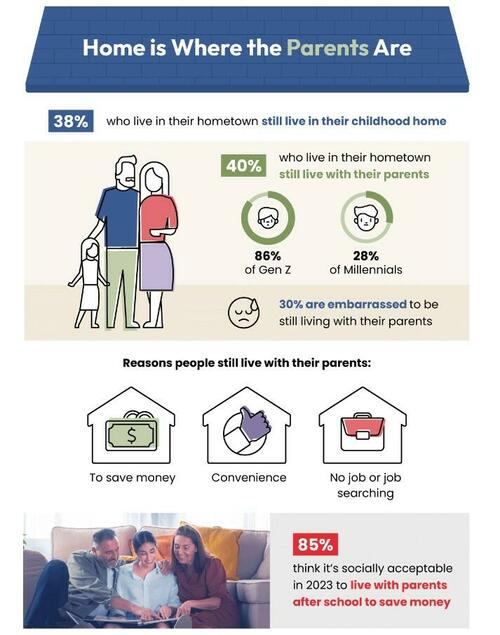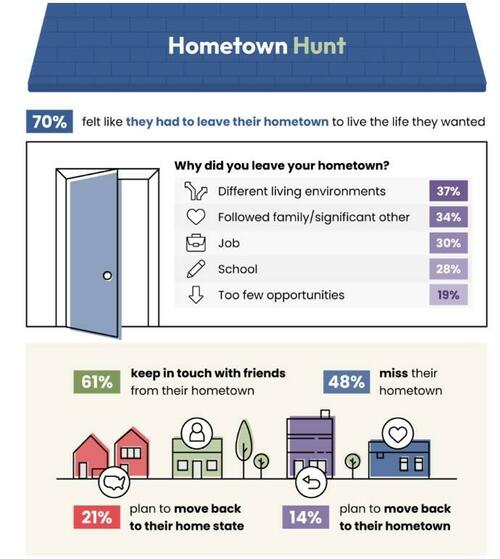2-Out-Of-3 Gen Z-ers Still Get Financial Help From Their Parents
A recent poll surveying 1,000 U.S. residents reveals that a sizable number haven’t ventured as far from home as they once imagined they would. Close to one-third remain in the town where they grew up, and astonishingly, 40% of that group still share a roof with their parents.
And the reason many haven’t left home seems to be clear: nearly 2 in 3 Gen Zers receive financial help from their parents. 29% of Americans still live in their home town, according to a newly released study and data aggregated by AllStar Home.
The median distance that U.S. residents reside from their birthplace is a mere 30 miles. Those who haven’t crossed state lines are, on average, just a 47-minute drive away from their original stomping grounds, the study found.
The report noted that of the 29% who haven’t left their hometown, 41% intend to stay put indefinitely, while a majority of 52% have plans to relocate within the next half-decade. Interestingly, more women (47%) than men (38%) expressed surprise at still living in their hometown at this point in their lives. The primary factors keeping people close to home include emotional attachment and a sense of comfort, followed by financial constraints, employment opportunities, and a general apprehension about venturing into the unknown.
The term ‘townie,’ representing individuals who spend their entire lives in their birthplace, is embraced by nearly one in four respondents—24% to be exact. Among these self-identified townies, the majority are unapologetic about their lifestyle choice; a notable 51% claimed to wear the ‘townie’ label with pride.
The study also found that among those who have stayed in their hometown, 38% have remained in the home where they grew up, and an additional 40% are still living with their parents. The trend is especially pronounced among Gen Z, where an eye-opening 86% who remain in their hometown also live with their parents. This compares with 28% of Millennials. Although 85% of people view it as socially acceptable in 2023 to reside with parents post-education for financial reasons, a third (30%) admit to feeling some level of embarrassment about it.
In an intriguing twist dubbed the “reverse-boomerang effect,” it’s not just the young staying put; some parents are gravitating toward the places their adult children have moved to. Among those who have left their home state, 20% report that their parents followed suit. For Gen Zers who relocated out of state, this figure jumps to 40%.
The predominant motive for parents’ migration is the desire to be nearer to their offspring. Others cited a fondness for the new state or said that necessity and caregiving responsibilities drove the move. As for financial support, while 19% of respondents have financially assisted their parents this year, parents are more likely to return the favor; nearly one-third (31%) state that they have received financial help from their parents in 2023.
Half of the respondents identified as male, while 48% were female and a minority of 2% identified as nonbinary. The age spectrum of those surveyed spanned from 18 to 77 years, with the mean age landing at 43. In terms of generational representation, the pool was evenly divided: a quarter each from Gen Z, Millennials, Gen X, and Baby Boomers. When it comes to living arrangements, 64% reside in standalone houses, 24% in apartments, 5% in townhomes, 4% in mobile homes, and a mere 3% occupy condominiums.
Tyler Durden
Mon, 10/02/2023 – 18:00
Zero Hedge’s mission is to widen the scope of financial, economic and political information available to the professional investing public, to skeptically examine and, where necessary, attack the flaccid institution that financial journalism has become, to liberate oppressed knowledge, to provide analysis uninhibited by political constraint and to facilitate information’s unending quest for freedom. Visit https://www.zerohedge.com

